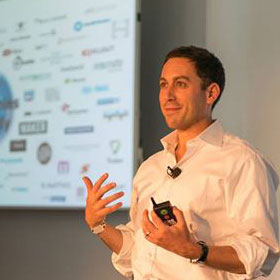What Makes a Great CEO?
Posted on . There are a lot of analogies for starts ups. It is a football game. It is a war. It is a poker match. I have heard all of them in the board room as we advise our portfolio companies.
There are a lot of analogies for starts ups. It is a football game. It is a war. It is a poker match. I have heard all of them in the board room as we advise our portfolio companies.
It is the job of CEOs to make decisions with limited information, and start-ups take that to an extreme. How will the market react? What will competitors do? Where will the capital come from? Plus the environment is changing rapidly. Sometimes it changes in your favor and sometimes it moves against you. We all make educated guesses, but the reality is occasionally a coin flip.
With this backdrop there is a sliding scale of personality types among CEOs. On one extreme, some CEOs proceed cautiously, take small steps, test, regroup, and solicit feedback. On the other extreme, some CEOs run full steam ahead and let the unknowns work themselves out. And there is every flavor in between.
Both extremes come with problems. The most cautious CEOs frequently suffer from “Failure to Launch”. They get trampled by competitors or they develop a product that is an incohesive jumble of features (I call these “camels”, based on a joke that “a camel is a horse by committee”). The most aggressive CEOs frequently suffer from “Failure to Scale”. They don’t delegate, they get blindsided by market forces, or they lose ground on fundraising because they push for irrational terms while better-funded competitors pass them by.
You might expect that the best option is to be smack in the middle; however my observation is that our most successful CEOs tend to skew towards the aggressive end of the spectrum. They relentlessly beat up competitors, but they are charming about it. They solicit advice, but only from a few trusted sources. They stretch investors on valuation, but the financing closes quickly and in the end everyone makes money.
This personality type works for a lot of reasons. The start-up world is competitive (hence all the combat analogies) and it favors aggressive traits. Good CEOs know that a dozen other companies are working on their very same idea, and at least one of them will charge over the hill. They want to be in front of the press and drive name recognition. Most importantly they execute. One of my CEOs recently said in a board meeting, “I don’t want it perfect. I want it Tuesday.” He will build a billion dollar business.
The lesson I learned early on is that it is better to have a flawed plan than flawed execution. Good executors can figure it out along the way. And that is what makes a great early stage CEO.

Ian Sigalow
http://sigalow.comIan is a co-founder and partner at Greycroft Partners in New York City. He has been a venture capitalist since 2001.
AUTHOR MarcoJus
Posted on 4:35 pm January 7, 2024.
Russia is increasing its exports
https://siburperm.com/